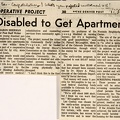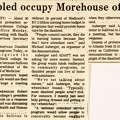Rocky Mountain News March 26, 1977
News PHOTO by John Gordon: A small person (Mary Cisneros) with apparently no legs is seen from the back in wheelchair, wheeling through an empty lot. In the background is a clothes line with clothes hanging out to dry.
[Headline] The beginning of a quiet war
Once destined to spend her life in state institutions, Mary Cisneros, 25, is starting over. She lives in a Denver apartment and plans to become a tutor for the blind.
Here, she's shown at the Atlantis Community, where she and others have found new hope. Atlantis is working on behalf of the disabled.
Handicapped starting a 'quiet revolution'
continued from....
,,, the first time. For others, it means learning how to read and write.
Mrs. Sue Sutherland, 23, is one of two women who tutor the Atlantis residents, using a special teaching machine developed by a University of Colorado professor.
A staff of 27 persons, including some who were themselves rescued from institutional settings, provides attendant care. Their pay comes from the state and county attendant allowances of up to $217 per month to which many in Atlantis are entitled by law.
A HOTLINE CONNECTS the housing units and the apartments of those no longer at Las Casitas, so residents can seek help quickly in emergencies. The job of manning the line is one of many tasks performed by the residents.
Each is paid $50 a month, a figure arrived at because anything higher would oblige the recipients to involve themselves in red tape - and, in many cases, to lose the welfare payments they now receive.
Most residents draw $184 a month in public assistance, most of it coming in the form of federal "SSI" payments. The rest comes from the state. From this, they pay $101 for room and board.
Blank is the highest paid staff member. He gets about $8,000 a year from a combination of state and private grants. This leaves him eligible for food stamps. Administrator Mary Penland "gets paid when we can scrounge it up," and Kopp - who lives in Blank's house and has bought a third of it - hasn't been paid a dime of salary during his two years as co-director.
Needless to say, Atlantis has made waves. lt has clashed with doctors who insist that the place for severely disabled persons is in an institution. And it has fought with those label people as "mentally retarded," saying the phrase is largely meaningless.
"WE TOTALLY REFUSE to use that label here." says Blank. “We don't think the term is applicable to most young people. If they're retarded, it's socially retarded."
Blank bubbles with excitement at the success stories of the people around him - those he proudly describes as “my circle of friends. “ And their affection for him is equally visible.
There is Gary Van Lake. a 24-year-old Wyoming native who broke his neck in a 1973 car crash. Wyoming rehabilitation officials insisted he had no hope of returning to a normal life.
"They told me I had reached my potential," he recalls.
Coming to Denver to attend college, he wound up in a nursing home. Atlantis got him out and helped him get into Craig Hospital where he learned anew how to do things like go to the bathroom and drive a car. Now he has a specially equipped van, complete with an elevator for his electric wheelchair, and is engaged to marry in May.
An outsider, viewing the rundown setting and the severity of the residents' physical problems, has to rely on their words and smiles to know how much their lives have improved.
ONE TESTIMONIAL came from John Folks, 21, who has been paralyzed from the neck down since he was shot in June 1972. He breathes through a tube in his throat and uses a specially equipped telephone with a loudspeaker and a switch that he can trigger by moving his head to one side.
Soon after Blank told how Folks had joined other Atlantis residents on a camping trip last summer. Folks explained how he felt about leaving the nursing home in which he lived for nine months before he came to Atlantis:
“It's just like getting out of prison. lt is like starting over again. "
Acknowledging that he and others at Atlantis “are somewhat egotistical" in their boasts of success, he adds: "We have to be to survive." But he also contends that the boasts are well-founded.
For one thing, he notes, Atlantis has caught President Carter's fancy and could play a role in Carter's upcoming plans to revamp the welfare system.
Last summer, when candidate Carter passed through Denver on the campaign trail, he met briefly with Atlantis officials. This week, two HEW aides from Washington came to Denver for a briefing on what Atlantis is doing.
And a thick report, put together by Atlantis with an $82,500 federal grant, will go to Washington as Colorado's minority report at the White House Conference on Handicapped Individuals.
The May event, planned when Gerald Ford was still president, is the first of its kind. lt is expected to set the stage for significant action by Congress to aid the nation's disabled citizens.
The money for the Atlantis reports which was unveiled in February, came as a belated response to the original efforts of Blank and Kopp to get enough money so they could build Atlantis from the ground up. When the money came through in 1976, they knew it wouldn't be enough to get them out of Las Casitas. But they saw the value of a comprehensive report about the need of the disabled.
ITS CONCLUSIONS are clear and blunt. Blunt as Wade Blanks words when he describes why Atlantis has the potential to be seen us model for the nation.
“Our critics say all we have to offer is the slums," he noted a couple of days ago. "Yet 55 people are on our waiting list."
"I think the nursing homes are going to have to start watching their words because the waiting list indicates, in essence, that these people would rather live in a slum than in a nursing home "
NEXT: “We are demanding our rights."
- Created on
- Wednesday 10 July 2013
- Posted on
- Saturday 20 February 2016
- Tags
- apartments, Atlantis Community, attendant services, education, Gary Van Lake, Glenn Kopp, HEW - Health Education and Welfare Dept., hot line, institutions, John Folks, Las Casitas Housing, Mary Cisneros, Mary Penland, MR label, President Jimmy Carter, report, Wade Blank, White House Conference on the Handicapped
- Albums
- Visits
- 3333
- Rating score
- no rate
- Rate this photo


0 comments